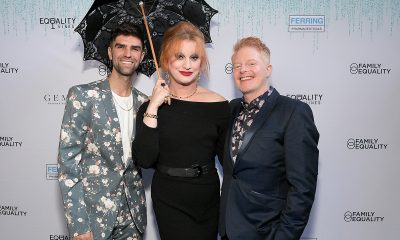Books
“Gay Like Me” is a guidebook for the LGBTQIA journey
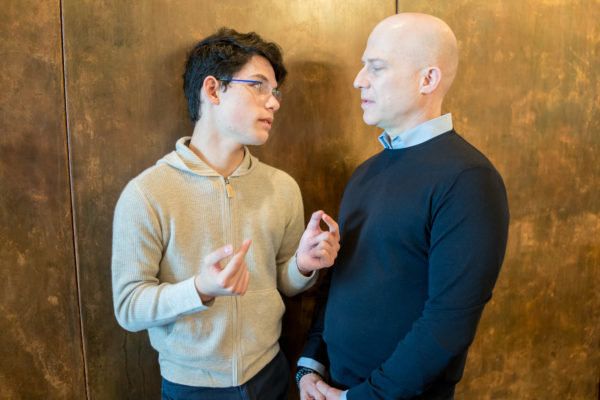
Richie Jackson and his son Jackson. (Photo provided by author)
When I think of my childhood growing up in a small town near Fresno, CA as a young Gay Latino and son of a cop, I can’t help but think of how easier it would have been, especially in the 80’s, if someone had handed me a “Gay Bible” to help me navigate becoming an adult as a young Gay man. Something to warn me about rough times ahead but also about the beauty that lied ahead and the exciting adventures that were in my future as part of this special and loving LGBTQ+ community.
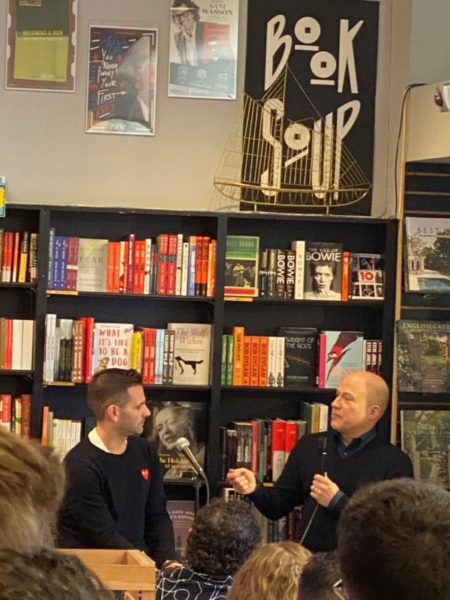 Richie Jackson has provided his son, Jackson, just that – a short book of advice, Gay Like Me, that every Gay man should read at any age and also our straight allies, some of whom are now parents to Gay adolescents about to embark on the world and find their own special place within the LGBTQ+ community.
Richie Jackson has provided his son, Jackson, just that – a short book of advice, Gay Like Me, that every Gay man should read at any age and also our straight allies, some of whom are now parents to Gay adolescents about to embark on the world and find their own special place within the LGBTQ+ community.
When I first stumbled onto this book about to be published, the notion of a father providing this to his son seemed so foreign to me, especially being the son of a macho Latino cop who had his own struggle of raising his youngest son, a feminine young boy who was constantly teased thru out his childhood. I was constantly told, “run like a boy”, “don’t always hang out with the girls” and “be a man”. My first thought after learning of this book was how lucky Richie’s son was to have this “Gay” light steering him at such a young age.
Speaking with Richie the other day, it is clear why it was so important for him to provide his son with this unique tool, having realizing those crucial experiences in his own young adult life that shaped who he has become. ” Everything in my own life has led me to write the book I so desperately needed when I was young, that our son now needs and that so many of us are hungry for,” he expressed.
All you have to do is listen to Richie for a few minutes and you can feel the immense love he has for his son. It fuels him. It’s part of his purpose in life that is not lost on him.
In fact, he almost lost him and did lose Jackson’s twin brother at birth, something I have a little insight on as I too was a twin, who died when we were born, as we were also premature like Richie’s twin boys. It’s evident that his love for Jackson and need to protect him started on that fateful day in which Jackson “came out” early the day he was born.
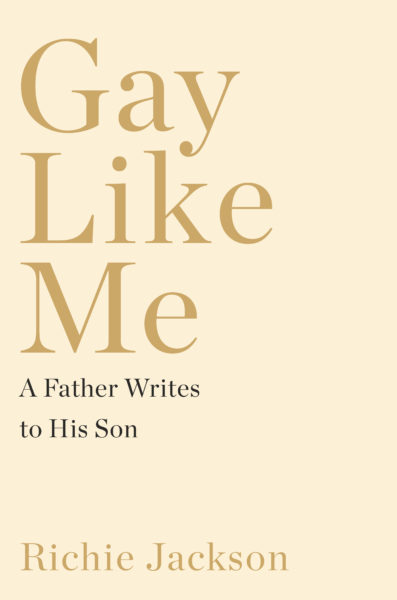 Only a few years apart, I enjoyed reading these all too familiar experiences Richie details in the book such as living in a world before dating apps when we had to go to bars or cruise-y places in order to meet someone and hook up or engage in that “3 second” stare as you are walking down the street and turning around to see if there was mutual interest and then if you were lucky could find yourself in a more compromising position in the middle of the day – something today’s youth can easily miss as they are glued to their mobile devices walking down the street and fueled by technology.
Only a few years apart, I enjoyed reading these all too familiar experiences Richie details in the book such as living in a world before dating apps when we had to go to bars or cruise-y places in order to meet someone and hook up or engage in that “3 second” stare as you are walking down the street and turning around to see if there was mutual interest and then if you were lucky could find yourself in a more compromising position in the middle of the day – something today’s youth can easily miss as they are glued to their mobile devices walking down the street and fueled by technology.
I pointed out to Richie that I see so many young Gay men now who don’t feel compelled to break away from their straight friends after high school as being Gay is so much more accepted now, so a typical Friday night can include them hanging out in a straight bar, something I never really enjoyed. I embraced the Gay spaces. I embraced a sense of community and creating a “tribe” of other young Gay men who I could learn from, swap stories with and have each other’s backs no matter what. This book reminds you of why these things are important in discovering your identity and place in the world and within the LGBTQ+ community.
Richie has seen his book explode onto the scene being embraced from all sub- communities within the LGBTQ+ community and notable figures and celebs like Arianna Huffington and Queer Eye’s Antoni Porowski., both of whom recently hosted events celebrating the release. While that he enjoys all of the praise and support within the community there is another sector who’s love for the book is giving him particularly great pleasure – parents of young Gay males.
” I have been getting a lot of great reactions from parents, who thank me for helping them understand the Gay experience, and who almost see it as a contemporary parenting book”, explained Jackson.
And while the praise from adults is greatly appreciated, it is most clear that the feedback he loves the most is that from young Gay men who were his targeted audience as he strived to illustrate their importance to society and promote self love and confidence within themselves. ” I’ve enjoyed hearing from young Gay men who see this book as almost a permission slip to be who they are. Part of why I wrote this was to put out something for young Gay men to hear that they are a marvel, to hear that they have been chosen to live this extraordinary life and that being Gay is truly a gift,” expressed Jackson.
We certainly agreed on this. We both love the fact that we were born Gay and that we’ve been given this “gift” in life. Another great gift? Gay Like Me – order your copy now.
Books
New book helps vulnerable people to stay safe
‘The Cost of Fear’
By Meg Stone
c.2025, Beacon Press
$26.95/232 pages
The footsteps fell behind you, keeping pace.
They were loud as an airplane, a few decibels below the beat of your heart. Yes, someone was following you, and you shouldn’t have let it happen. You’re no dummy. You’re no wimp. Read the new book, “The Cost of Fear” by Meg Stone, and you’re no statistic. Ask around.

Query young women, older women, grandmothers, and teenagers. Ask gay men, lesbians, and trans individuals, and chances are that every one of them has a story of being scared of another person in a public place. Scared – or worse.
Says author Meg Stone, nearly half of the women in a recent survey reported having “experienced… unwanted sexual contact” of some sort. Almost a quarter of the men surveyed said the same. Nearly 30 percent of men in another survey admitted to having “perpetrated some form of sexual assault.”
We focus on these statistics, says Stone, but we advise ineffectual safety measures.
“Victim blame is rampant,” she says, and women and LGBTQ individuals are taught avoidance methods that may not work. If someone’s in the “early stages of their careers,” perpetrators may still hold all the cards through threats and career blackmail. Stone cites cases in which someone who was assaulted reported the crime, but police dropped the ball. Old tropes still exist and repeating or relying on them may be downright dangerous.
As a result of such ineffectiveness, fear keeps frightened individuals from normal activities, leaving the house, shopping, going out with friends for an evening.
So how can you stay safe?
Says Stone, learn how to fight back by using your whole body, not just your hands. Be willing to record what’s happening. Don’t abandon your activism, she says; in fact, join a group that helps give people tools to protect themselves. Learn the right way to stand up for someone who’s uncomfortable or endangered. Remember that you can’t be blamed for another person’s bad behavior, and it shouldn’t mean you can’t react.
If you pick up “The Cost of Fear,” hoping to learn ways to protect yourself, there are two things to keep in mind.
First, though most of this book is written for women, it doesn’t take much of a leap to see how its advice could translate to any other world. Author Stone, in fact, includes people of all ages, genders, and all races in her case studies and lessons, and she clearly explains a bit of what she teaches in her classes. That width is helpful, and welcome.
Secondly, she asks readers to do something potentially controversial: she requests changes in sentencing laws for certain former and rehabilitated abusers, particularly for offenders who were teens when sentenced. Stone lays out her reasoning and begs for understanding; still, some readers may be resistant and some may be triggered.
Keep that in mind, and “The Cost of Fear” is a great book for a young adult or anyone who needs to increase alertness, adopt careful practices, and stay safe. Take steps to have it soon.
The Blade may receive commissions from qualifying purchases made via this post.
Books
A taste for the macabre with a side order of sympathy
New book ‘The Lamb’ is for fans of horror stories
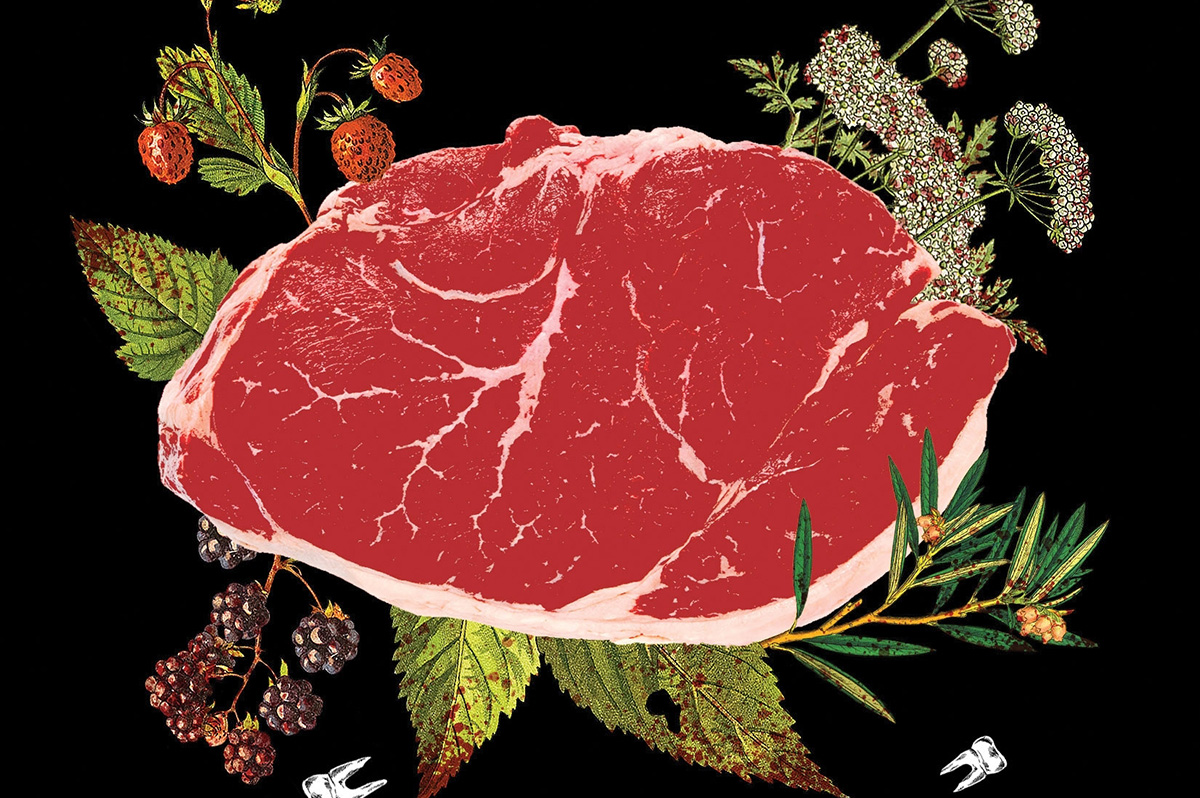
‘The Lamb: A Novel’
By Lucy Rose
c.2025, Harper
$27.99/329 pages
What’s for lunch?
You probably know at breakfast what you’re having a few hours later. Maybe breast of chicken in tomato sauce. Barbecued ribs, perhaps? Leg of lamb, beef tongue, pickled pigs’ feet, liver and onions, the possibilities are just menus away. Or maybe, as in the new book, “The Lamb” by Lucy Rose, you’ll settle for a rump roast and a few lady fingers.

Margot was just four years old when she noticed the mold on the shower walls, and wondered what it might taste like. She also found fingers in the shower drain from the last “stray,” the nails painted purple, and she wondered why they hadn’t been nibbled, too.
Cooked right, fingers and rumps were the best parts.
Later, once Margot started school, Mama depended on her to bring strays from the woods to their cottage, and Mama would give them wine and warm them up. She didn’t often leave the house unless it was to bury clothing and bones, but she sometimes welcomed a gardener who was allowed to leave. There was a difference, you see, between strays and others.
But Eden? Margot couldn’t quite figure her out.
She actually liked Eden, who seemed like a stray but obviously wasn’t. Eden was pretty; she never yelled at Margot, although she did take Margot’s sleeping spot near Mama. Eden made Mama happy; Margot could hear them in the bedroom sometimes, making noises like Mama did when the gardener visited. Eden was a very good cook. She made Mama softer, and she made promises for better times.
And yet, things never got better. Margot was not supposed to call attention to herself, but she wanted friends and a real life. If she was honest, she didn’t want to eat strays anymore, either, she was tired of the pressure to bring home dinner, and things began to unravel. Maybe Mama didn’t love Margot anymore. Maybe she loved Eden better or maybe Mama just ached from hunger.
Because you know what they say: two’s company, three’s a meal.
Not a book to read at lunch? No, probably not – although once you become immersed in “The Lamb,” it’ll be easy to swallow and hard to put down.
For sure, author Lucy Rose presents a somewhat coming-of-age chiller with a gender-twisty plot line here, and while it’s occasionally a bit slow and definitely cringey, it’s also really quite compelling. Rose actually makes readers feel good about a character who indulges in something so entirely, repulsively taboo, which is a very surprising – but oddly satisfying – aspect of this unique tale. Readers, in fact, will be drawn to the character Margo’s innocence-turned-eyes-wide-open and it could make you grow a little protective of her as she matures over the pages. That feeling plays well inside the story and it makes the will-they-won’t-they ending positively shivery.
Bottom line, if you have a taste for the macabre with a side order of sympathy, then “The Lamb” is your book and don’t miss it. Fans of horror stories, this is a novel you’ll eat right up.
The Blade may receive commissions from qualifying purchases made via this post.
Books
‘Cleavage’ explores late-in-life transition
An enjoyable collection of work from a born storyteller
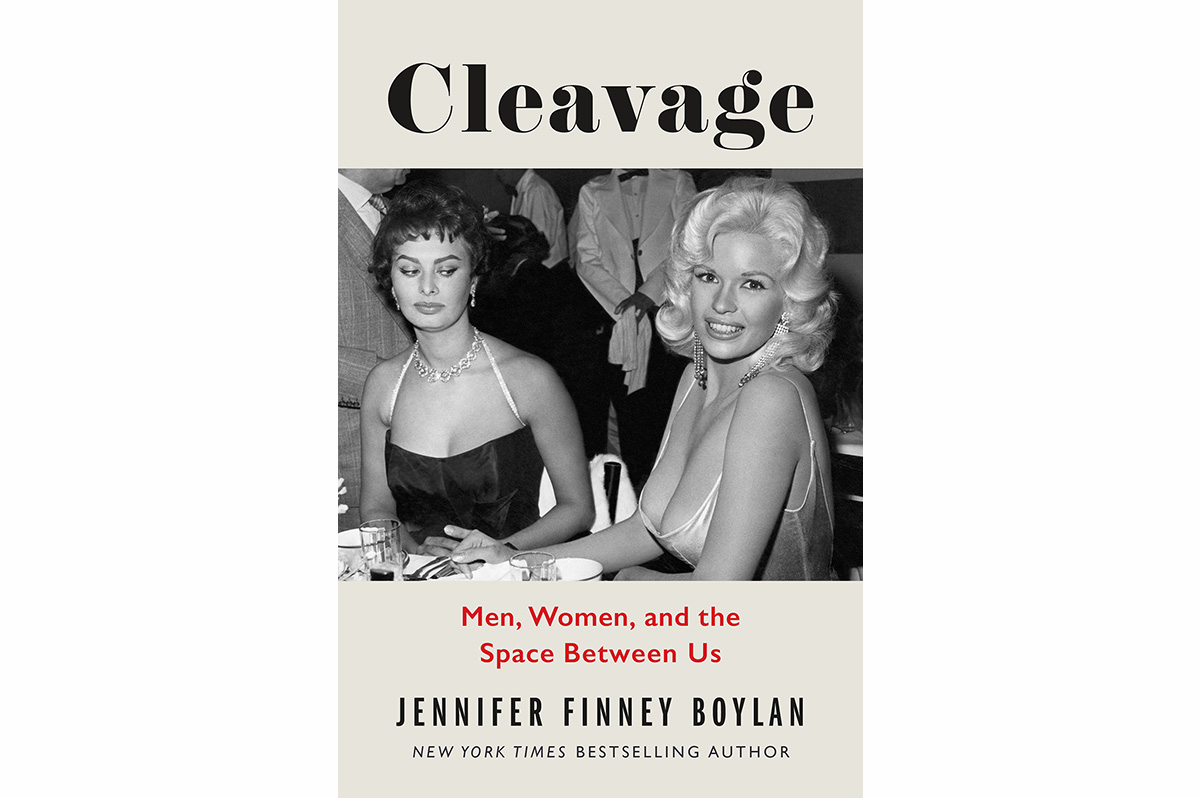
‘Cleavage: Men, Women, and the Space Between Us’
By Jennifer Finney Boylan
c.2025, Celadon Books
$29/256 pages
When it came to friends and family, your cup used to runneth over.
You had plenty of both and then, well, life and politics wedged an ocean-sized chasm between you and it makes you sad. And yet – are you really all that far apart? As in the new memoir, “Cleavage” by Jennifer Finney Boylan, maybe you’re still two peas in a pod.

Once upon a time not so long ago, Jennifer Finney Boylan was one of “a group of twelve-year-old Visigoths” intent on mischief. They hung around, did normal boy stuff, setting off rockets, roughhousing, roaming, rambling, and bike-riding. The difference between Boylan and the other boys in her group was that Jim Boylan knew she was really a girl.
Then, she vowed that it was a “secret no soul would ever know,” and James went to college, enjoyed a higher metabolism, dated, fell in love too easily, then married a woman and fathered two boys but there was still that tug. Boylan carried the child she once was in her heart – “How I loved the boy I’d been!” – but she was a woman “on the inside” and saying it aloud eventually became critical.
Boylan had a hard talk with her wife, Deedie, knowing that it could be the end of their marriage. She’s eternally grateful now that it wasn’t.
She’s also grateful that she became a woman when she did, when politics had little to do with that personal decision. She worries about her children, one who is trans, both of whom are good, successful people who make Boylan proud. She tries to help other trans women. And she thinks about the words her mother often said: “Love will prevail.”
“Our lives are not a thing to be ashamed of,” Boylan says, “or apologized for, or explained. Our lives are a thing of wildness, and tenderness, and joy.”
Judge “Cleavage” by its cover, and you might think you’ll get a primer on anatomy. Nope, author Jennifer Finney Boylan only has one chapter on the subject, among many. Instead, she leans heavily on her childhood and her transition rather late in life, her family, and her friends to continue where her other books left off, to update, correct, and to share her thoughts on that invisible division. In sum, she guesses that “a huge chunk of the population… still doesn’t understand this trans business at all.”
Let that gentle playfulness be a harbinger of what you’ll read: some humor about her journey, and many things that might make your heart hurt; self-inspection that seems confidential and a few oh-so-deliciously well-placed snarks; and memories that, well told and satisfying, are both nostalgic and personal from “both the Before and the After.”
This book has the feel of having a cold one with a friend and Boylan fans will devour it. It’s also great for anyone who is trans-curious or just wants to read an enjoyable collection of work from a born storyteller. No matter what you want from it, what you’ll find in “Cleavage” is a treasure chest.
The Blade may receive commissions from qualifying purchases made via this post.
Books
From genteel British wealth to trans biker
Memoir ‘Frighten the Horses’ a long but essential read

‘Frighten the Horses: A Memoir’
By Oliver Radclyffe
c.2024, Roxane Books/Grove Atlantic
$28/352 pages
Finding your own way.
It’s a rite of passage for every young person, a necessity on the path to adulthood. You might have had help with it. You might have listened to your heart alone on the quest to find your own way. And sometimes, as in the new memoir, “Frighten the Horses” by Oliver Radclyffe, you may have to find yourself first.

If you had observed Oliver Radclyffe in a random diner a few years ago, you’d have seen a blonde, bubbly, but harried mother with four active children under age seven and a distracted husband. You probably wouldn’t have seen trouble, but it was there.
“Nicky,” as Radclyffe was known then, was simmering with something that was just coming to the forefront.
As a young child, Nicky’d been raised in comfort in a family steeped in genteel British wealth, attended a private all-girl’s school, and never wanted for anything. She left all that behind as a young adult, and embraced the biker lifestyle and everything it entailed. The problem now wasn’t that she missed her old ways; it was that she hated life as a wife and mother. Her dreams were filled with fantasies of “exactly who I was: a man on a motorbike, in love with a woman.”
But being a man? No, that wasn’t quite right.
It took every bit of courage she had to say she was gay, that she thought constantly about women, that she hated sex with men. When she told her husband, he was hurt but mostly unbothered, insisting that she tell absolutely no one. They could remain married and just go forward. Nothing had to change.
But everything had already changed for Nicky.
Once she decided finally to come out, she learned that friends had already suspected. Family was supportive. It would be OK. But as Nicky began to experiment with a newfound freedom to be with women, one thing became clear: having sex with a woman was better when she imagined doing it as a man.
In his opening chapter, author Oliver Radclyffe shares an anecdote about the confusion the father of Radclyffe’s son’s friend had when picking up the friend. Readers may feel the same sentiment.
Fortunately, “Frighten the Horses” gets better — and it gets worse. Radclyffe’s story is riveting, told with a voice that’s distinct, sometimes poker-faced, but compelling; you’ll find yourself agreeing with every bit of his outrage and befuddlement with coming out in a way that feels right. When everything falls into place, it’s a relief for both author and reader.
And yet, it’s hard to get to this point because this memoir is just too long. It lags where you’ll wish it didn’t. It feels like being burrito-wrapped in a heavy-weighted blanket: You don’t necessarily want out, but you might get tired of being in it.
Still, it remains that this peek at transitioning, however painful, is essential reading for anyone who needs to understand how someone figures things out. If that’s you, then consider “Frighten the Horses” and find it.
Books
‘Radiant’ an illuminating biography of Keith Haring
Author captures artist’s complexities in sympathetic new book
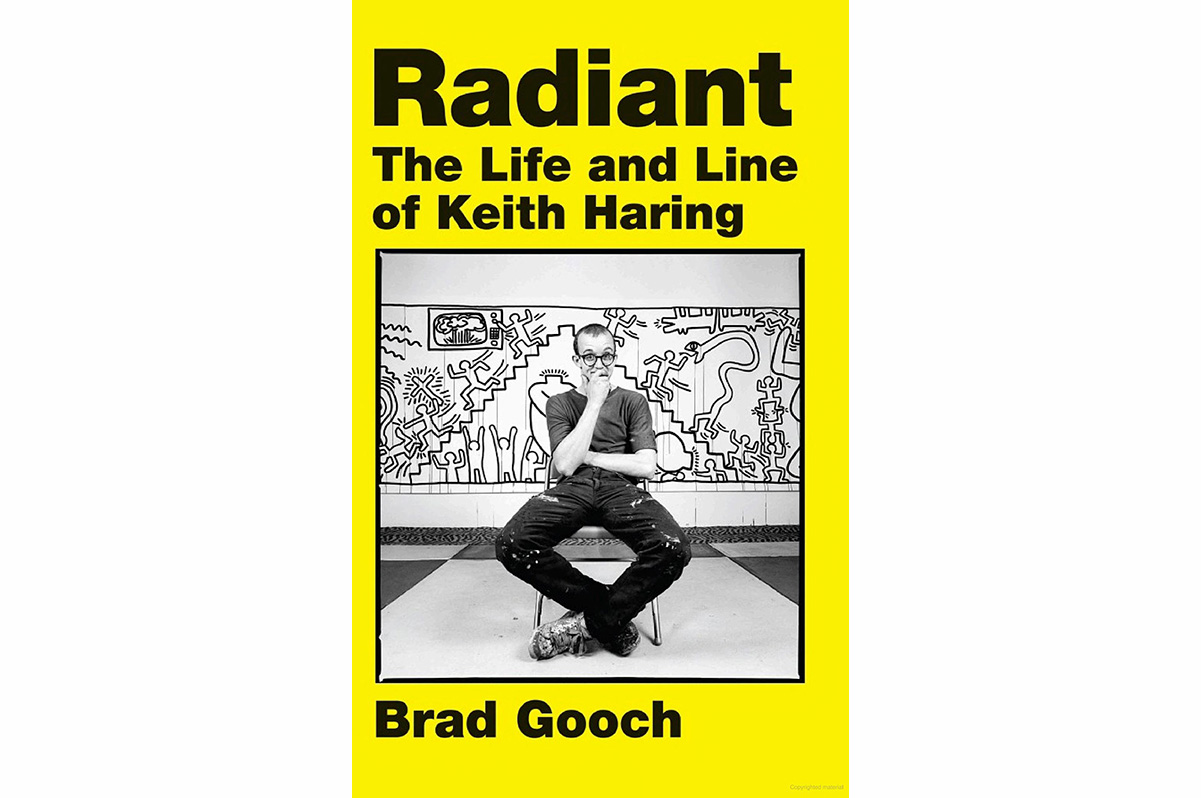
‘Radiant: The Life and Line of Keith Haring’
By Brad Gooch
c.2024, Harper
$20/502 pages
“Radiant” is an illuminating biography of the talented artist Keith Haring, who made his indelible mark during the 1980s before dying young of AIDS. Brad Gooch, biographer of poets Frank O’Hara and Rumi, follows Haring from his childhood in Kutztown, Pa., to his early days in New York City painting artistic graffiti, to his worldwide fame and friendships with Andy Warhol and Jean-Michel Basquiat.

The eldest of three children and the only boy, Haring learned to draw early on from his father. Art quickly became a lasting obsession, which he pursued fiercely. Growing up in a small, conservative town, he was drawn to countercultural movements like hippies and religious “Jesus freaks,” although he mostly found the imagery and symbols appealing.
He studied commercial art in Pittsburgh but later dropped out, spending several years working and learning at the Pittsburgh Arts and Crafts Center, before moving to New York City in 1978. Studying painting at the School for Visual Arts, he also learned about video and performance art, making interesting projects. He also began drawing images on subways and blank advertisement backboards. One of his most distinctive was the Radiant Baby, a crawling baby shooting rays of light.
Gooch begins the biography with his own encounter with this public art, which felt colorful and “extremely urgent.” It had to be done guerilla-style, before the authorities could catch him, and they were frequently painted over. He was arrested a few times.
Ironically, a few years later Haring would be paid huge sums and flown around the world to create large-scale art on public property. People were amazed at how quickly he worked, even in terrible conditions. Sometimes at these events, while a crowd was gathered, he would draw and give away the artwork. Knowing that his art in galleries sold for incredible amounts, he enjoyed occasionally frustrating the art world’s commercial desires.
His Pop Shops also revealed Haring’s competing impulses. Opened in 1986, first in New York and later in Tokyo, they put his art on all sorts of merchandise, including T-shirts and posters. On the one hand, they allowed ordinary people to buy his work at reasonable prices. However, they also earned him more money and increased his public image.
He made art for everyone. His best-known pieces, featuring babies and dogs, are colorful and family friendly. Some even consider it “lightweight.” He eagerly created murals and artwork for elementary schools and neighborhoods. But he also made art with social and political commentary and sexual explicitness. “Michael Stewart – USA for Africa” depicts a graffiti artist’s strangulation by New York City Transit Police officers. He painted “Once Upon a Time…” for the men’s bathroom of New York City’s Lesbian & Gay Community Center.
Haring worked nearly right up to his death in 1990. The Keith Haring Foundation keeps his work in the public eye, while also funding nonprofits working with disadvantaged youth and AIDS education. Gooch captures Haring’s complexities; he befriended graffiti artists of color and dated working-class men, but was sometimes ignorant about how his wealth and fame affected these relationships. Well written and sympathetic, the book can sometimes overwhelm in detail about life in the 80’s and Haring’s celebrity friends.
Books
New book is a fun whodunit set in London drag world
‘Murder in the Dressing Room’ will keep readers guessing
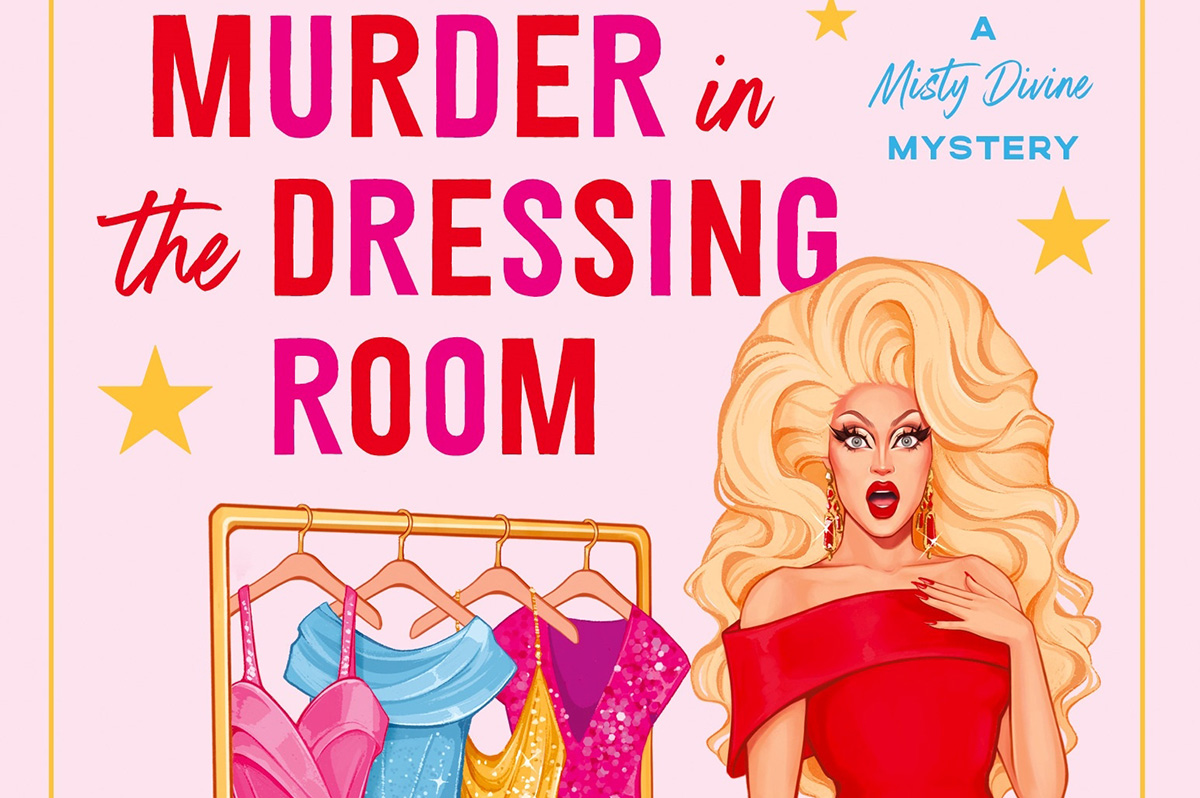
‘Murder in the Dressing Room’
By Holly Stars
c.2025, Berkeley
$19/368 pages
Your alter ego, the other half of your double life, is a superhero.
When you’re quiet, she’s boisterous. Your confidence is flat, hers soars. She’s a better dresser than you; she’s more popular, and maybe even a little smarter. By day, you live a normal existence but by night, your other side roars and in the new mystery, “Murder in the Dressing Room” by Holly Stars, both of you solve crimes.

Lady Lady had been a little off all evening.
As owner of London’s most fabulous, elegant drag club, she was usually in command but her protegee, Misty Devine, could tell that something was wrong.
She discovered how wrong when she found Lady Lady on her dressing room floor, foaming at the mouth, dead, poisoned by a mysterious box of chocolates.
Hours later, Misty de-dragged, morphing from an elegant woman to an ordinary, binary hotel employee named Joe who was heartbroken by the tragedy. Only employees had access to Lady Lady’s dressing room – ergo, someone they knew at the club had to be the killer.
Obviously, the London detectives assigned to the case had a suspect list, but Misty/Joe and their boyfriend Miles knew solving Lady Lady’s murder was really up to them. They knew who the killer wasn’t, but who had reason to kill Misty’s mentor?
Maybe Mandy, the club’s co-owner. The club’s bartender and bouncer were both sketchy. Lady Lady had spats with two employees and a former co-worker, but was that motive enough? When the dress Lady Lady was wearing that night proved to have been valuable stolen goods, Joe’s investigation list grew to include people who might have sneaked backstage when no one was paying attention, and a shady man who was suddenly following them around.
Then Misty learned that she was in Lady Lady’s will, and she figured the inheritance would be minor but she got a huge surprise. Lady Lady’s posthumous gift could make others think that Misty might’ve had reason to kill her.
And just like that, the suspect list gained another entry.
When you first get “Murder in the Dressing Room” in your hands, hang onto it tight. It’s fun, and so fluffy and light that it might float away if you’re not careful.
The story’s a little too long, as well, but there’s enjoyment to be had here, and authenticity enough to hold a reader’s attention. Author Holly Stars is a drag performer in London and somewhat of a murder maven there, which gives her insight into books of this genre and the ability to string readers along nicely with solid characters. If you’re unfamiliar with the world of drag you’ll also learn a thing or two while you’re sleuthing through the story; drag queens and kings will like the dual tale, and the settings that anchor it.
As a mystery, this is fun and different, exciting, but tame enough for any adult reader. If you love whodunits and you want something light, “Murder in the Dressing Room” is a double delight.
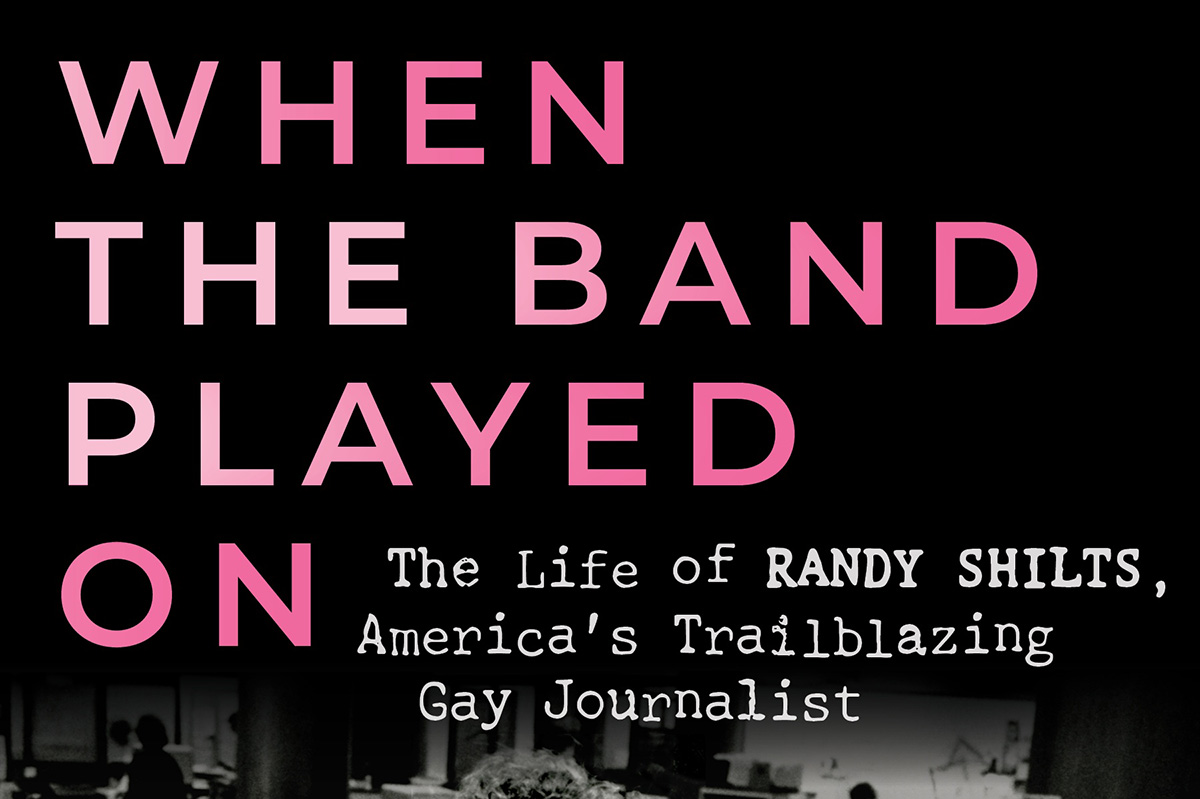
‘When the Band Played On’
By Michael G. Lee
c.2025, Chicago Review Press
$30/282 pages
You spent most of your early career playing second fiddle.
But now you’ve got the baton, and a story to tell that people aren’t going to want to hear, though it’s essential that they face the music. They must know what’s happening. As in the new book “When the Band Played On” by Michael G. Lee, this time, it’s personal.

Born in 1951 in small-town Iowa, Randy Shilts was his alcoholic, abusive mother’s third of six sons. Frustrated, drunk, she reportedly beat Shilts almost daily when he was young; she also called him a “sissy,” which “seemed to follow Randy everywhere.”
Perhaps because of the abuse, Shilts had to “teach himself social graces,” developing “adultlike impassiveness” and “biting sarcasm,” traits that featured strongly as he matured and became a writer. He was exploring his sexuality then, learning “the subtleties of sexual communication,” while sleeping with women before fully coming out as gay to friends.
Nearing his 21st birthday, Shilts moved to Oregon to attend college and to “allow myself love.” There, he became somewhat of an activist before leaving San Francisco to fully pursue journalism, focusing on stories of gay life that were “mostly unknown to anyone outside of gay culture.”
He would bounce between Oregon and California several times, though he never lost sight of his writing career and, through it, his activism. In both states, Shilts reported on gay life, until he was well known to national readers and gay influencers. After San Francisco supervisor Harvey Milk was assassinated, he was tapped to write Milk’s biography.
By 1982, Shilts was in love, had a book under his belt, a radio gig, and a regular byline in a national publication reporting “on the GRID beat,” an acronym later changed to AIDS. He was even under contract to write a second book.
But Shilts was careless. Just once, careless.
“In hindsight,” says Lee, “… it was likely the night when Randy crossed the line, becoming more a part of the pandemic than just another worried bystander.”
Perhaps not surprisingly, there are two distinct audiences for “When the Band Played On.” One type of reader will remember the AIDS crisis and the seminal book about it. The other is too young to remember it, but needs to know Randy Shilts’s place in its history.
The journey may be different, but the result is the same: author Michael G. Lee tells a complicated, still-controversial story of Shilts and the book that made America pay attention, and it’s edgy for modern eyes. Lee clearly shows why Shilts had fans and haters, why Shilts was who he was, and Lee keeps some mystery in the tale. Shilts had the knowledge to keep himself safe but he apparently didn’t, and readers are left to wonder why. There’s uncomfortable tension in that, and a lot of hypothetical thinking to be had.
For scholars of gay history, this is an essential book to read. Also, for anyone too young to remember AIDS as it was, “When the Band Played On” hits the right note.
The Blade may receive commissions from qualifying purchases made via this post.
Books
‘Hello Stranger’ unpacks the possibilities of flirting
Manuel Betancourt’s new book contains musings on modern intimacy
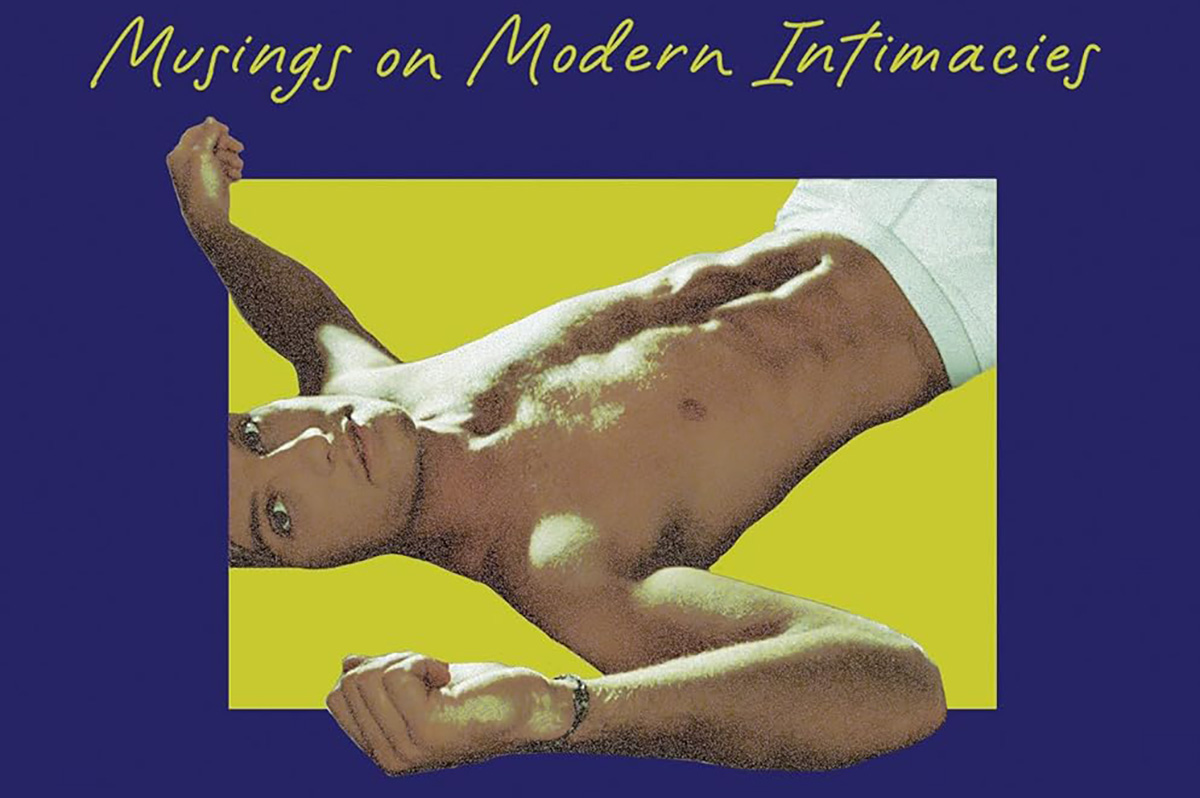
‘Hello Stranger: Musings on Modern Intimacies’
Published by Catapult
Available Jan. 14; hardcover $27
Two strangers lock eyes across a bar. Or maybe they reach for the same book on a shelf in a bookstore. Or maybe they’re a model and artist, exchanging nervous smiles as the artist tries to capture a piece of the model’s soul on canvas or film.
In a Hollywood film, we’d be led to believe that these moments are laden with momentous importance – a flicker of sexual charge and desire, a chemical reaction that leads inexorably to life-altering romance and happily ever after.
But in his new book of essays “Hello Stranger: Musings on Modern Intimacies,” queer Colombian film and culture critic Manuel Betancourt unpacks the notion that flirting needs to be anything more, suggesting that flirtation can be a worthwhile endeavor in itself.

“One of the things that if you read any kind of love story or watch any kind of rom-com, you’re constantly encouraged to think that flirtation is sort of like preamble to something else,” Betancourt tells me over cookies outside of Levain bakery in Larchmont.
“Actually, flirtation doesn’t need to do that. You can flirt just for the act of flirting, and that can be fun, and that can be great. What is it that you find instead in that moment of possibility, at that moment when anything can happen? Just what happens when you’re trying to be the best person you could be? It’s almost more exciting when you know, there’s nothing else on the horizon.”
But “Hello Stranger”isn’t a how-to guide to flirting. It’s more like a cross between cultural criticism and memoir.
Over a series of essays that alternate between examinations of flirting scenes in movies, books, and art, and anecdotes from his own personal life, Betancourt traces the ways that we use flirting to create different kinds of intimacies.
“This is not a how-to, because I don’t think gay men need help with that,” Betancourt says. “But I also know that I’m a gay man in Los Angeles whereas I know there are young folks in Ohio that may not think of it this way because they’ve been conditioned, and actually we now have such a breadth of gay literature and a culture that’s continually teaching us we need to find the one.”
The book is a deeply personal one for Betancourt, who recently got divorced from his husband and joined a polyamorous relationship as he began writing it.
“I’ve been thinking a lot about different intimacies with strangers, with friends, with lovers, things that fell outside of what we understand as traditional. And so it felt like an easy way to turn all of these things that I was dealing with on a personal level into a more cohesive and coherent project,” he says.
“I wanted to think through where the joy in flirtation lies. Like, why are we so drawn to it? Why was I so drawn to it? Why do I enjoy it so much? And of course, being the kind of literary academic that I was, I was willing to find other people must have thought about this, other people must have depicted it on screen and books,” he says. “Other people can teach me about this.”
The book starts with examinations of the fleeting, flirtatious intimacies seen in films like “Closer” and “Before Sunrise,” before diving into more complicated (and queer) relationships in the books “The Sexual Outlaw” and “A Little Life” and the portraiture of photographer Peter Hujar, using them as springboards to examine Betancourt’s own relationships to cruising, dating, nudity, and relationships both monogamous and otherwise.
“I wanted to begin with those straight, very common, understandable ways of thinking about these things, and then the book slowly gets clearer and we end in polyamory and conceptual monogamy, and these very different ways of thinking.
“What else I wanted to do for those gay readers that are maybe looking to find something here, is show that none of this is new. I think a lot of us try to think, like, ‘This is modern and polyamory is so 2024,’ but what I wanted to do is give a cultural history of that.”
Though it’s not an instruction manual, Betancourt says he did improve his own flirtation skills while researching the book, as evidenced in a spicy anecdote he recounts in the book about cruising a man in a hotel bar, where he was actually working on writing “Hello Stranger.”
“You just have to pay attention, open yourself up, which is also what Hollinghurst, writes in ‘The Swimming-Pool Library.’ His protagonist is able to like cruise and hook up anywhere he wants to in London, because he’s always looking, like literally looking. He’s constantly out seeing the world as if it’s a cruising playground and that is all apparently you need to do.
“If you’re crossing paths and you see someone who you’re attracted to and you lock eyes, that is the moment to make something happen and it’s about being open to the possibility and then also letting the other person know that you are.”
Nurturing that openness was difficult at first for Betancourt, due to his upbringing in Bogota, Colombia.
“For me it was a very different cultural thing because of the kind of culture of violence, the culture of unsafety in Colombia. You’re sort of encouraged to not really trust anyone,” he says. “It takes almost locking that away because you can’t approach any of those situations with fear.”
“This is about, like, teaching myself because I’m not great at it either. So, it’s about reminding myself, oh yeah, be open and more attentive.”
The Blade may receive commissions from qualifying purchases made via this post.

‘Cher: The Memoir Part One’
By Cher
c.2024, Dey St.
$36/413 pages
Mother knows best.
At least that’s what she’d like you to think because she said it a hundred times while you were growing up, until you actually believed. One day, though, if you were lucky, you learned that Mother didn’t always know best, but she did her best – like in the new book “Cher: The Memoir Part One” by Cher, when Mom helped make a star.

Though she doesn’t remember it, little Cheryl Sarkisian spent a few weeks in a Catholic Charities orphanage when she was tiny, because her father had disappeared and her mother couldn’t afford to take care of her. “Cheryl,” by the way, was the name on her birth certificate, although her mother meant to name her “Cherilyn.”
That first time wasn’t the last time little Cher was left with someone other than her mother, Jackie Jean, a beautiful, talented struggling singer-actress who’d been born into poverty and stayed there much of her life. When money was tight, she temporarily dropped her daughter off with friends or family, or the little family moved from house to house and state to state. Along the way, relocating in and out of California gave Cher opportunities to act, sing, and to learn the art of performance, which is what she loved best.
In the meantime, Jackie Jean married and married again, five or six husbands in all; she changed her name to Georgia, worked in the movies and on TV, and she gave Cher a little sister, moved the family again, landed odd jobs, and did what it took to keep the lights on.
As Cher grew up in the shadow of her glamorous mother, she gained a bit of glam herself, becoming sassy and independent, and prone to separation anxiety, which she blamed on her abandonment as a small child. In her mother’s shadow, she’d always been surrounded by movie and TV stars and, taking acting classes, she met even more.
And then she met Salvatore “Sonny” Bono, who was a friend before he was a lover. So, here’s the very, very happy surprise: “Cher: The Memoir Part One” is a downright fun book to read.
If you’ve ever seen author Cher in interviews or on late night TV, what you saw is what you get here: bald-faced truth, sarcastic humor, sass, and no pity-partying. She tells a good story, ending this book with her nascent movie career, and she leaves readers hanging in anticipation of the stories she’ll tell in her next book.
The other happy surprise is that this memoir isn’t just about her. Cher spends a good amount of the first half writing about her mother and her grandmother, both complicated women who fought to keep their heads and those of their offspring above water. Readers looking between the lines will be enthralled.
Surely, “Cher: The Memoir Part One” is a fan’s delight, but it’s also a great memoir for anyone who particularly loves the genre and doesn’t mind a bit of profanity. If that’s you, then you got this, babe.
The Blade may receive commissions from qualifying purchases made via this post.
Books
A tale of lesbian romance and growing into your place in life
‘I’ll Get Back to You’ an enjoyable holiday read

‘I’ll Get Back to You’
By Becca Grischow
c.2024, Penguin Books
$19/320 pages
Christmas tree lots, ugh. Santa, New England, snowflakes, mistletoe, blah blah blah.
The cable TV lineup is full of that stuff this time of year but it’s nowhere near as magical as Hollywood wants you to believe. Honestly, thinking of romance (or the lack thereof) right now is almost enough to bring out your humbug. Get this, though: There’s plenty of romance to go around this Yuletide, but in “I’ll Get Back to You” by Becca Grischow, it might take some planning to find it.

It was supposed to be a great dual-birthday celebration.
Murphy and her BFF, Kat, were planning a “Blackout Wednesday” of drinking and debauchery, followed by a sleepover and snacks at Murphy’s house before they went to Kat’s parents’ place for Thanksgiving. That was the plan, until Kat ruined it by bringing her new boyfriend, Daniel, along and assuming that Murphy wouldn’t mind.
Murphy minded very much. She hated being the gay third wheel, and it was doubly annoying when they all ran into Ellie, who’d graduated a few years before Kat and Murphy.
Wait, Ellie was straight in high school, wasn’t she? Well, she wasn’t now and when Ellie, Kat, and Daniel started comparing notes about attending the University of Illinois, it was all Murphy could do not to roll her eyes.
She wasn’t feeling this holiday thing. She was feeling kind of loser-ish, in fact: still living in her childhood bedroom in her parents’ house, working a job she’d had since she was 16, still at community college and failing accounting.
And, apparently, failing at love, too, because Ellie told Murphy that they could be friends, and that was all. But when Murphy realized that Ellie’s mother was the professor who was about to fail her in accounting class, Ellie came up with a plan.
If they could pretend to have a relationship, then maybe Ellie’s mother would grant Ellie her dream of attending college in New York City. And maybe she’d “play favorites” and give Murphy a passing grade.
It was a weird plan. Super weird.
Alright, let’s just admit this: A book like “I’ll Get Back to You” isn’t going to change the world or influence people in high places. It’s probably not going to land on the bestseller list. It’s just a light, fun little story – and isn’t that what you need during the holiday season?
With your typical girl-meets-girl, struggle-and-argument, wacky-plan-happy-ending format, author Becca Grischow tells a tale of friendship and romance and growing into the place in life that’s meant to be, which is a good but subtle reminder for some readers who need it. Grischow gives readers a cast of characters who are kind but authentic, fallible but trustworthy, and mostly pretty likable, too, which makes this an easy book to enjoy at just the right time.
If you haven’t found your holiday romance for the season yet, here’s one to look for beneath the mistletoe. Find “I’ll Get Back to You” and you’ll like it a lot.
-

 a&e features3 days ago
a&e features3 days agoMusical Mondays, a mainstay in WeHo nightlife, celebrates 16 years
-

 National2 days ago
National2 days agoDiscredited former cop played ‘key role’ in deportation of gay make-up artist
-

 Arts & Entertainment3 days ago
Arts & Entertainment3 days ago‘Bring it to Brunch’ returns to West Hollywood
-

 Myanmar3 days ago
Myanmar3 days agoLGBTQ+ advocacy group joins Myanmar earthquake relief effort
-

 California2 days ago
California2 days agoSouth Park provides green space to a predominantly Latino community
-

 a&e features3 days ago
a&e features3 days agoPeppermint thrives in the spotlight
-

 Arts & Entertainment17 hours ago
Arts & Entertainment17 hours agoSouth Coast Repertory Theatre hosting world premiere production
-

 Arts & Entertainment12 hours ago
Arts & Entertainment12 hours agoA Night of Legacy, Love, and Liberation: Inside the 2025 April Fool’s Ball
-

 Movies2 hours ago
Movies2 hours agoHeartfelt ‘Wedding Banquet’ remake a romcom worth seeing

